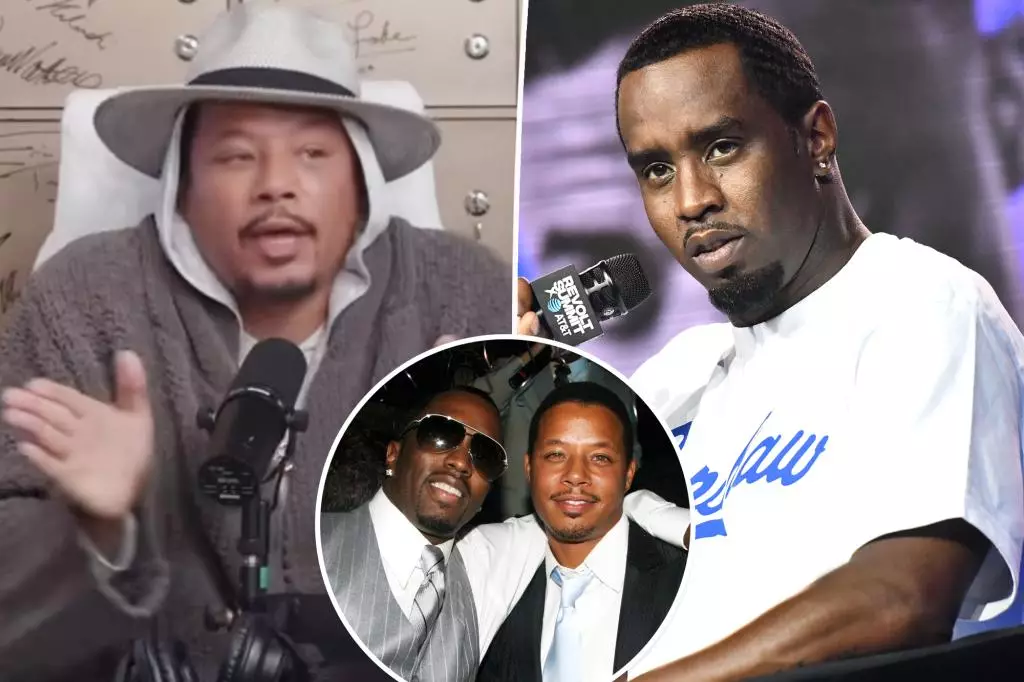Terrence Howard, the accomplished actor known for roles in films like *Hustle & Flow* and *Iron Man*, recently dropped a bombshell during a candid appearance on the *PBD Podcast*. The revelations regarding Sean “Diddy” Combs, who is currently embroiled in federal allegations of sex trafficking and multiple sexual assault lawsuits, are more than just sensational claims; they spotlight the dark side of fame and the predatory behaviors that can pervade the entertainment industry. Howard’s account is troubling not only for the direct implications concerning Combs but also for the broader picture it paints about power dynamics and masculinity in Hollywood.
Allegations and Underlying Tensions
In his interview, Howard revealed that Diddy had repeatedly sought his company, ostensibly to coach him in acting. Yet, what should have been a straightforward mentorship turned disturbing. Howard stated that during their meetings, Diddy behaved in a disconcerting manner, simply watching him without engaging meaningfully. The chilling moment arrived when Howard’s assistant suggested that Diddy might have ulterior motives. This suggestion prompted Howard to sever ties with the music mogul. The implications of these allegations are monumental, suggesting a predatory inclination that hasn’t been adequately addressed within pop culture.
Howard’s grievances are not isolated. He pointedly referenced similar encounters with various producers throughout his career, indicating that these types of behaviors are not anomalies but part of a pervasive culture that normalizes exploitation. His assertion that he has “lost businesses” due to his refusal to compromise his masculinity reveals a troubling dichotomy where success can often hinge on a surrender of self-respect and boundaries. This admission drives home a painful reality: in the world of entertainment, the price for maintaining one’s dignity can be steep.
The Symbolism of Masculinity
Howard’s insistence that he will not “play gay roles” highlights a complex facet of masculinity in Hollywood. The stigma associated with vulnerability, particularly among men, has stifled honest dialogue about sexuality and personal boundaries. For Howard, the term “man card” embodies a societal expectation that demands adherence to traditional normativity at the expense of authenticity.
His comments raise questions about how male artists navigate their identities in an environment rife with machismo and pressure to conform. The rigidity of these expectations can foster conditions where predatory behavior flourishes. Celebrities like Howard have wielded their visibility to challenge these norms, yet the industry still grapples with the consequences of its underlying toxicities.
The Broader Implications of Diddy’s Charges
Diddy’s ongoing legal turmoil broadens the conversation beyond Howard’s allegations. With numerous accusers stepping forward against Combs, including non-celebrities, it suggests a troubling pattern of behavior rather than isolated incidents. The fact that allegations extend from Howard—a high-profile figure—down to others who lack the same visibility illustrates the potential for systemic abuse.
As these allegations continue to unfold, the response from peers in the industry becomes pivotal. Howard’s claims are not merely about his experience; they could potentially resonate with the multitude of individuals affected by Diddy’s alleged activities. The dismissal or credibility of accusations made against a powerhouse like Diddy raises ethical concerns about accountability and justice within the entertainment complex.
The Potential for Change in the Industry
Howard’s revelations may herald a call to action for transformation within the entertainment industry. His willingness to speak out against what he perceived as predatory behavior is a critical step toward addressing broader issues of misconduct. There exists a clear need for reform—not just in terms of systemic structures that allow such behavior to perpetuate, but also in fostering environments where artists feel secure voicing their experiences and grievances.
In a climate increasingly demanded to confront its past, stories like Howard’s serve as catalysts for discussion. They compel individuals to reflect on the environments in which they work and challenge the status quo. Moreover, they reinforce the importance of listening to and elevating the voices of those who previously remained silent, holding powerful figures accountable for their actions.
This confluence of events surrounding Howard’s experience with Diddy elucidates a calling for industry-wide introspection, urging a shift away from the pervasive cultural norms that have fostered silence and suffering. The question remains: will the industry respond with meaningful change or continue to shield its entrenched power players?
